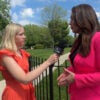Congress is postponing huge issues until after the elections and there’s a danger in that.
Senator Russ Feingold (D-WI) sounded a warning in 2006 when the last big majority shift happened on Capitol Hill, but Congress then returned for a lame duck session:
The Daily Signal depends on the support of readers like you. Donate now
It would be a huge mistake to overlook the potential for damage in the lame duck session. A lame duck session doesn’t sound like anything to worry about, but this lame duck may be a lot more dangerous than people think. We can expect Republicans to try to jam through as much of their agenda as they can while they have the chance.
This year it’s the Democrats who may stuff major controversies into a post-election free-for-all, but Feingold’s principle holds true: Politicians who won’t face the voters ever again–or not for at least two years–have less accountability, especially when they know it’s their last chance before a major power shift.
Whether the GOP takes the majority in either house this fall does not change the universal expectation that Democrats’ margin will shrink dramatically, crippling the ability to pass their agenda come January. However tough that agenda seems now, it’s easy compared to post-election.
Spending could re-explode in a lame-duck Congress because all decisions on how much to spend next year have been delayed. Neither house of Congress has adopted a budget resolution (for the first time since 1974), and none of the appropriations bills have even cleared a subcommittee.
Retiring House Appropriations Chairman David Obey (D-WI), typically a staunch defender of following regular order, could see his final year blemished if the spending is rolled up into omnibus bills with who-knows-what policy riders tacked on.
A lame-duck session would offer a last-gasp chance to enact some form of carbon tax, energy tax, cap-and-trade, or requirement that utilities must use politically-correct wind or solar power rather than more consumer-affordable fossil fuels. Or card-check measures. Or the Employee Non-Discrimination Act. Or any of a multitude of provisions that now cannot pass on their own but could be stuffed into a massive last-gasp hard-to-stop appropriations omnibus.
How many members of Congress will then feel freed from political restraints and therefore more likely to approve controversial measures? 37 House members are leaving that body voluntarily; two more have lost primaries; several others could be ousted in primaries; and dozens more are projected to fall in November. Among Senators, twelve are departing; two more have been defeated in primaries so far.
Projections vary, with Larry Sabato predicting the GOP will gain 32 in the House and 7 in the Senate. CQ Politics says it could be 32 in the House and 12 in the Senate. Real Clear Politics says it could be 57 seats in the House. All see a majority change as definitely possible in the House but a much lower likelihood in the Senate.
Those who already know they’re lame ducks may be willing to wheel-and-deal right now. But those who hope to survive November are still in wait-and-see mode.
With so many voters already angry at Washington, a multitude of major legislation is stymied by pre-election political timidity. But many of the political reasons for that reluctance historically evaporate quickly once Election Day recedes. As has been noted, lame ducks can easily become wild ducks.
Major environmental laws were passed by a lame-duck Congress in 1970; gasoline taxes were raised (and Congressional pay) in 1982; President Bill Clinton was impeached in 1998.
Another dynamic takes hold with departing lawmakers: Some try to cozy up to future employers. That could be a friendly Administration that can appoint its friends as deputy undersecretary of something, or perhaps as ambassador to a nice tropical island. Of the future could be landing a mega-bucks job opportunity in the lobbying community.
There is a first principle involved here that surpasses politics. Because the public loses its leverage with lame ducks, liberals, conservatives and moderates should agree that a lame-duck Congress is not a proper way to govern. Any major decision that they’re not willing to make before the election is one they should not be permitted to make afterwards.































